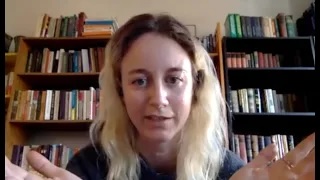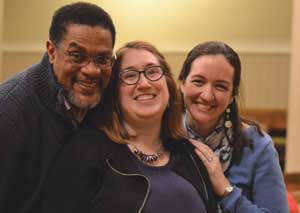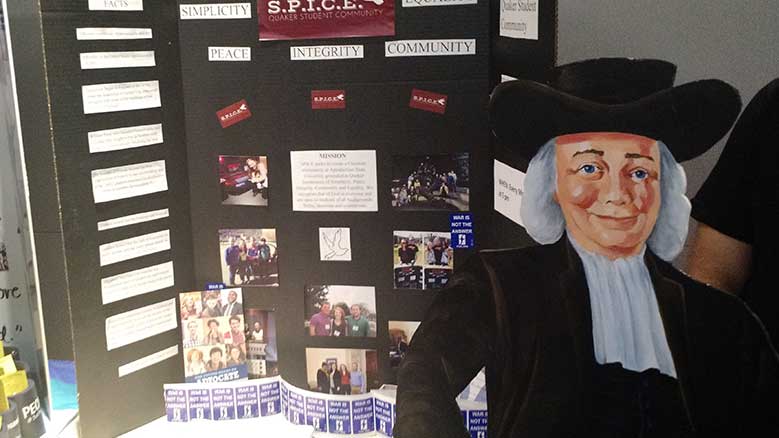One of the difficult issues for Quakers is leadership. Somehow we know we need leaders, yet we are all supposed to be leaders, which makes being followers a somewhat prickly business—for our leaders! Arlene Kelly, in being faithful to her ministry, has been called into various leadership positions, for which she has spent much of her adult life learning, preparing, and growing in her skills.
"In college I was a counselor at a Y camp, where we looked at different religions, including Quakerism, which interested me. I started attending Central Philadelphia (Pa.) Meeting as a junior in college. I liked Friendly Persuasion, agreed with the Peace Testimony, and was drawn in by the form of worship. I soon joined, even though I was spiritually immature. Sometimes, in working with new Friends, I find it good to remember that!"
Arlene cites several mentors to her spiritual development. When she joined meeting she was the young person! "Joseph Karsner took me under his wing," she remembers. "I went to the World Conference in ’67 because Joe said, ‘I’ve suggested your name and I want you to go.’ I don’t remember whether he really wagged his finger at me, but it felt that way. He also suggested me for overseers and said, ‘I want you to say ‘yes’" (even though she had to ask what an overseer was).
"Mary M. Rogers, who has been dead for a number of years, was another model. In the middle of a difficult discussion she could participate actively, with a kind of equanimity that I found remarkable, admire, and even strive for, but it’s not my strong point."
Arlene has always lived in or near Philadelphia. In graduate school at University of Pennsylvania, where she got her Master’s in Social Work, she learned important skills from two of her advisors. The first, Laura Downs, "I wanted to emulate. She was very clear about who she was; she didn’t fear those different from her. So you could be yourself and wrestle with things—she would engage back, which was very liberating."
Arlene recalls her second-year advisor, who was the exact opposite, but also important. "She said to me, ‘You’re stronger than I am; all I have is my authority’ (including whether her advisees could remain in the program and graduate). When I handed in the topic chapter of my thesis, my advisor said, ‘This chapter is not acceptable,’ telling me what needed attention. I didn’t understand the point she was making, but I knew from struggles we had already had that I couldn’t question her because she wouldn’t take it well. So I did my best to become an active listener. After wrestling with it for three days, I understood what she had been saying. I reworked the chapter, taking into account her comments, and turned it in. When I went to get it she said, ‘I cried when I read it,’ she was so happy."
The integration of Arlene’s Quakerism and her professional career began in the mid-’70s. She recounts, "Annemargret Osterkamp, whom I call the grande dame of Friends Counseling Service, invited me to participate. I was to work three hours a week, developing a presence at Friends Center. Although the goal was not well defined, I began to reach out to meetings—an opportunity to integrate my professional life and my spiritual life, and to visit many meetings within the yearly meeting."
Her work with meetings has continued to develop. Currently she has three major leadership roles: clerk of her monthly meeting, clerk of Philadelphia Yearly Meeting, and a newly funded project the yearly meeting has adopted, "Deepening and Strengthening Our Meetings as Faith Communities." Arlene says, "When I go to a meeting I must help people be clear about which hat I’m wearing!" Isn’t this a bit of an overload? "I felt it was appropriate to say ‘yes’ to being clerk because I see clerking and the work it entails, both for the monthly meeting and the yearly meeting, in terms of strengthening community—I see it as congruent ministry approached from different ways and fitting together.
"I know listening well is one of my strengths, which is important in clerking, where one must help people hear what they are saying, sometimes in a deeper way than they might hear themselves. I also know that I must always remember, this is not in my hands, turning it over to the Spirit’s having room to work—allowing people to discover the wisdom and strength among themselves.
"I am a rather willful person, so ‘not my will, but thine’ has been the major discipline for me as a Quaker. I know from experience that the Spirit doesn’t let one down. I take times to center, mainly in solitude, emptying myself, remembering that I serve best when I get out of the way, especially if there’s business about which I have strong opinions. I have a sense of those things I do well and try to give my time to those."
While the Quaker form of worship was what initially drew Arlene in, and she continues to feel "it is crucial to attend meeting for worship as the most shared experience in a meeting, it is not," she says, "what nurtures me most fully. When I am in a leadership position with the meeting, journeying together to witness to ‘walking the talk’—those are the times I find the richest."
Family has had both joys and sorrows for Arlene. "My parents were active in the Episcopal Church but divorced when I was about seven. After the divorce, my mother saw to it that my brother and I were confirmed, but we didn’t attend church because she didn’t." Alcoholism has affected the lives of several close family members, and even caused the death of two. Arlene says, "Being a counselor and not being able to help those I loved was very difficult. My only blood relatives now are my brother’s two sons and their families, who are very important to my partner, Helene, and me and with whom we have a good relationship.
"Helene and I have been together 22 years. Ours is a significant family relationship. It has been important to me that by and large Friends in the Philadelphia area have been hospitable to me as a lesbian, obviously integral to who I am, but I don’t see it as relevant to the work I do in active leadership.
"Sometimes working collaboratively is hard for me. Wanting to fulfill my high expectations can sometimes be a gift and sometimes a royal pain in the neck. Also, it’s important to me to be able to count on things. I’m not a person who likes to shift gears at the last minute, especially if my head is into something else. Predictability has high value for me. But I know that gets boring!"
What does she do for relaxation? "Watch football games—I’m a Philadelphia Eagles fan. I enjoy watching those who are athletically skilled like Donovan McNabb. I like other sports, too, certainly the Olympics. Arlene added with a smile that "Years ago, I played Ms. Pacman—don’t do that now, doesn’t fit my image!"
She’s a Quaker leader, spiritually disciplined, self-aware, serious about her work, continuing to learn, and she has a wry sense of humor. What more could we ask?





